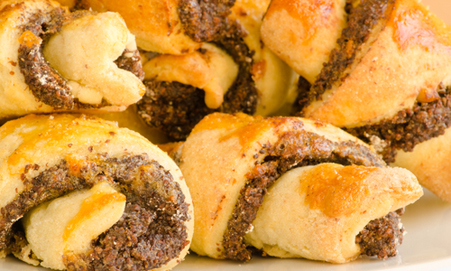Growing up, I loved kiddush. It was the reason I went to temple—or at least it was my favorite part of going to temple. I knew there was more to services than the mounds of cookies that came after Adon Olam. The junior congregation service, intended for Hebrew school-aged children, was fun. We prayed, and there were activities to keep us engaged. We learned that temple was exciting and meaningful while being introduced to the basics of the service. For me, the fun just happened to continue at kiddush, and Adon Olam was my cue.
The junior congregation kiddush always had Drake’s goodies like Yodels or Devil Dogs. But the adult kiddush, usually sponsored by that week’s bar or bat mitzvah family, was where the real treats could be found. Here were the cookies I longed for—the kosher cookies that somehow made my Saturday special. Even though as a kid I should have liked Drake’s more, there was something about those adult kiddush cookies that did it for me. Perhaps it was in my DNA.
I would start with the yellow cookies with the pink or yellow circle in the middle—you know the ones—soft but with a nice little icing crunch. Then I would move on to rugelech, a cookie that speaks for itself. When I ate the rainbow cookies, I ate around the jelly (if only my childhood self understood the joys of jelly!). After the cookies, I would indulge in a marble slice. What more could a young kiddush lover ask for after a morning of davening?
Then, things changed for this Kiddush lover. No, I didn’t grow up and decide to give up cookies. Who would say no to a cookie at Kiddush? What a shonda. Instead, at 13, I was diagnosed with Celiac Disease. A diagnosis of celiac requires one to go on a gluten-free diet: a diet free of wheat, rye, and barely. The kosher kiddush cookies I once loved and devoured were now off limits. Kiddush was gluten. It was the end of an era.
At that time, I was very accepting of my diagnosis because I understood that my health was dependent on strictly following the new diet. There was no time to long for the gluten goodies I once ate. The kosher kiddush cookies were just cookies, and I could not have them.
I left it at that until I discovered gluten-free kosher cookies from Shabtai Gourmet and rugelech from Katz Gluten-Free. It was a gluten-free miracle. These cookies tasted just like kiddush. These cookies contained, for me, the essence of kiddush. They reminded me of the Saturdays of my childhood. Without realizing it, I had been longing for a gluten-free cookie in the style of a kiddush cookie.
My Judaism is by no means rooted in cookies, but those vivid kiddush memories are part of my relationship with my Judaism—just as being gluten-free is not who I am, but at the same time, it is a very real part of me. The rationale behind my post-diagnosis desire for cookies identical to those of my youth is common for a gluten-free eater. Often those of us on the gluten-free diet look for foods that are exact or very close replications of the gluten foods we once ate. I have found many replacement items that have had been meaningful for my palette, but the gluten-free kosher cookie discovery was monumental. Food is so enmeshed in the cultural fabric of being Jewish, and I was again able to feel like I could fully participate.
These days, my kiddush is no longer sponsored by the bar or bat mitzvah family, instead it’s brought to me by Shabtai Gourmet and Katz’s Gluten-Free. Shabtai Gourmet has the kosher classics, gluten-free: everything from Florentine Lace Cookies to Rainbow Cookies to Mini Black & Whites. Katz Gluten-Free has my chocolate rugelech. Together, these two companies recreated the essence of kiddush for me.
The gluten-free Jewish community can finally have their kiddush cookies, and eat them too.









